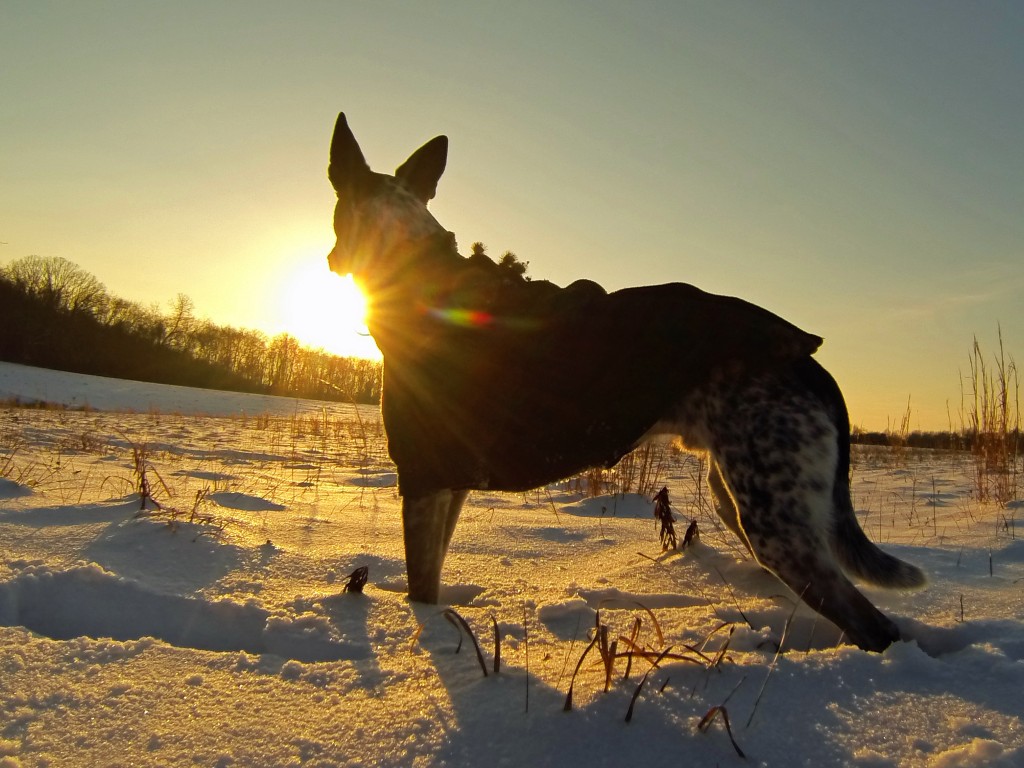Winter Time Blues
There are a lot of things I love about winter, the gorgeous snow falls, shoveling the deck/steps (yes, I really love shoveling the small areas–luckily our neighbors have a plow business and they clean our driveway), playing in the snow with the dogs, throwing snowballs at the dogs, the feeling of a quiet winter walk in the woods with a few inches of fresh powder, and watching the dogs rip around and tear up a field of untouched snow. Sure, by the end of winter I’m ready for spring but for the most part, in a typical winter, I enjoy the season.
Unfortunately winter can be an incredibly challenging time for dogs and their guardians (for those of us that have a winter season). It’s not just about the frozen toes, muddy feet, freezing cold walks, or frozen tennis balls but there are some serious issues that can pop up during the winter months.
Trouble Maker Returns!
Dogs who are generally perfect angels may start to get themselves into trouble. Maybe they counter surf for the first time in years, they decided to “redecorate” your living room, chew the remote, or turn pillows/sheets/towels/shoes/underwear into toys. It’s like the little “angel” on their shoulder goes on vacation and the little “devil” on their shoulder starts taking over.
Cabin Fever
Dogs who are typically low maintenance and low energy may start to go wild inside the house. They may get the zoomies every day, they may turn their dog bed (or more unfortunately your pillow) into a love toy, they may start chasing cats in the house or just generally being unsettled
Cranky-Pants
There are many household where dogs live together mostly okay but they exist on the edge of trouble or where dogs have had behavior modification and their unwanted behaviors are managed but not completely resolved and so they are also living on an edge. Well, winter often makes them tip over the edge into problematic behaviors. Dogs may start getting into more scuffles, they may be less tolerant of other animals in and out of the home, they may be less tolerant of human handlers, may be more likely to resource guard, or may just be a bit more edgy and likely to overreact.
Sit? I do not know the meaning of this word!
It’s pretty common that during winter time that dogs magically forget some of their training. Leash manners, recall, and greeting people appropriately seem to be some of the most common issues. It’s not surprising that these are the behaviors most frequently ‘lost’ in the winter because they are simply not practiced as often.
So what are the causes of these winter time issues with dogs? Well, I think that one of the biggest issues is the weather and the season in general. The freezing temperatures keep the dogs’ outside time to shorter walks and shorter playtimes (if any at all)–partially because the humans are uncomfortable and partially because some dogs are uncomfortable. The snow/ice may make walking or playing outside too treacherous so walks may not happen at all or may be seriously shortened to just potty breaks. The fact that it gets dark at 4 or 4:30 doesn’t lend itself to walks or playtime when guardians come home from work at 5 or 6pm and it’s completely dark outside. Getting dark crazy early also tends to make people feel more tired after work and less inspired to do anything. The lack of sun and vitamin D can definitely effect the mental health of the human counter part–gray days are not overly inspiring to get out and do something and many people get a case of the winter blues or a more serious seasonal depression. Add on top of ALL of that, the season is filled with holidays, interruptions to the normal schedule, visitors left and right, travelling here and there, and general disruption of routine that it certainly effects dogs’ stress levels and their behaviors.
All of these pieces lead to dogs who are not getting enough exercise, who aren’t getting out of the house to socialize, who aren’t getting the training they need, who aren’t having the opportunity to practice skills like loose leash walking and recall, and who are living with humans who may be dealing with seasonal depressions or just feeling blue who don’t have it in them to get out of the house.
With that in mind, what can you do to prevent these behavior problems? My best suggestions are to provide as much indoor stimulation and possible. Play indoor games like tug, indoor recall practice is amazing, use puzzle toys, kibble dispensing toys, take training classes, and play nose games inside. All of the mental games will help take the edge off and keep them mentally tired and many of the games have the secondary bonus of physically exercising the dogs. It’s incredibly hard to motivate oneself to spend tons of time in the freezing cold, so utilize as many indoor activities as possible and take advantage of every opportunity you have to get your dogs outside. Other great activities that I do in the winter are taking training classes as much as possible, getting the dogs to pet stores to work and practice our skills, get together with doggie friends together for schedule hikes and play dates as motivation to get the dogs out and about!
It’s a little late in the game but in my neck of the woods we are still on the edge of winter so hopefully it can be of use for someone!


Thank you for the reminder that spring will come soon and all will be right in the animal kingdom again!
Yep, yep, yep. Typically I don’t let myself fall victim to this but for some reason this winter I finally gave in to the seasonal lazies and all of these things apply. Not only have I been cutting our walks shorter and shorter but I have hardly done any fun training for the last three months. What is wrong with me? Hopefully I snap out of it soon before my dog goes back into house-destruction mode.